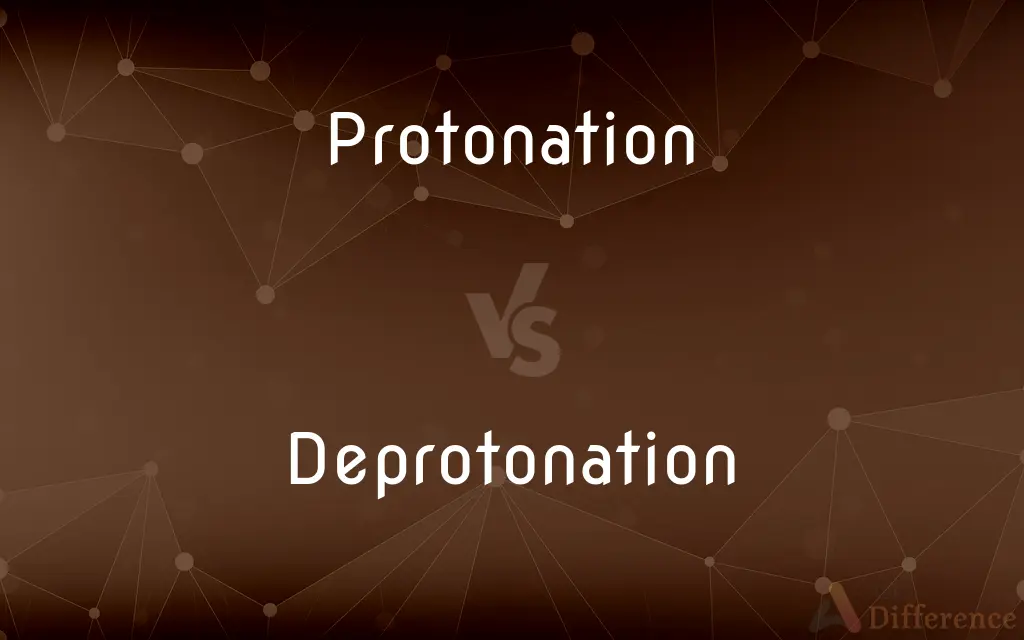Protonation vs. Deprotonation — What's the Difference?
Edited by Tayyaba Rehman — By Urooj Arif — Updated on March 20, 2024
Protonation is the process of adding a proton (H⁺) to a molecule, making it more positively charged, while deprotonation involves the removal of a proton from a molecule, resulting in a more negatively charged species.

Difference Between Protonation and Deprotonation
Table of Contents
ADVERTISEMENT
Key Differences
Protonation and deprotonation are fundamental processes in chemistry that alter the charge and reactivity of molecules. Protonation occurs when a proton (H⁺) is added to a molecule, leading to the formation of a positively charged ion or an increase in the molecule's positive charge. This process is crucial in various chemical reactions, including acid-base reactions where a base accepts a proton. Deprotonation, on the other hand, involves the removal of a proton from a molecule, thereby increasing the molecule's negative charge. This typically happens when an acid donates a proton to a base.
The propensity of a molecule to undergo protonation or deprotonation is determined by its pKa value, which reflects the acid's strength. Molecules with low pKa values are strong acids and are more likely to undergo deprotonation, while those with high pKa values are strong bases and more prone to protonation. The environment in which these processes occur, such as the solvent and temperature, also plays a significant role in their likelihood and extent.
In biological systems, protonation and deprotonation are essential for enzyme activity, transport of molecules across membranes, and regulation of pH in fluids like blood. For instance, the protonation state of amino acids in enzymes affects their shape and function, which in turn influences metabolic pathways and reactions.
Chemically, protonation can enhance the solubility of compounds in water by making them more polar, which is vital for reactions in aqueous solutions. Deprotonation, conversely, often activates molecules towards nucleophilic attack, making it a key step in many synthetic pathways, including the formation of carbon-carbon bonds.
Understanding the dynamics of protonation and deprotonation is fundamental in predicting the behavior of molecules in different chemical environments and is pivotal in the design of pharmaceuticals, the development of industrial catalysts, and the study of environmental processes.
ADVERTISEMENT
Comparison Chart
Charge Change
Increases positive charge
Increases negative charge
Process
Addition of a proton (H⁺)
Removal of a proton (H⁺)
Resulting Species
Positively charged ion or molecule
Negatively charged ion or molecule
Common in
Acid-base reactions, where bases accept protons
Acid-base reactions, where acids donate protons
Importance in
Enhancing solubility, enzyme activity
Facilitating nucleophilic attacks, enzyme regulation
Influenced by
PKa value, solvent, temperature
PKa value, solvent, temperature
Compare with Definitions
Protonation
The addition of a proton to a molecule.
The protonation of ammonia (NH₃) produces ammonium ion (NH₄⁺).
Deprotonation
Common in the formation of carbon-carbon bonds.
Deprotonation of a carbon acid can initiate nucleophilic attacks for bond formation.
Protonation
Influenced by the molecule's pKa value.
Molecules with high pKa values are more likely to undergo protonation.
Deprotonation
Results in a more negatively charged species.
Deprotonation is crucial for activating molecules towards chemical reactions.
Protonation
Increases the molecule's positive charge.
Protonation is key in forming hydronium ions (H₃O⁺) in water.
Deprotonation
The removal of a proton from a molecule.
The deprotonation of acetic acid (CH₃COOH) produces acetate ion (CH₃COO⁻).
Protonation
Essential for acid-base chemistry.
Protonation of a base by an acid is the fundamental step in acid-base reactions.
Deprotonation
Can activate molecules towards nucleophilic attack.
Deprotonated species often act as nucleophiles in organic synthesis.
Protonation
Affects molecule's reactivity and solubility.
Protonation can increase a molecule's solubility in water.
Deprotonation
PKa value is a key factor.
Substances with low pKa values readily undergo deprotonation.
Protonation
In chemistry, protonation (or hydronation) is the addition of a proton (or hydron, or hydrogen cation), (H+) to an atom, molecule, or ion, forming a conjugate acid. (The complementary process, when a proton is removed from a Brønsted–Lowry acid, is deprotonation.) Some examples include the protonation of water by sulfuric acid: H2SO4 + H2O ⇌ H3O+ + HSO−4 the protonation of isobutene in the formation of a carbocation: (CH3)2C=CH2 + HBF4 ⇌ (CH3)3C+ + BF−4 the protonation of ammonia in the formation of ammonium chloride from ammonia and hydrogen chloride: NH3(g) + HCl(g) → NH4Cl(s)Protonation is a fundamental chemical reaction and is a step in many stoichiometric and catalytic processes.
Deprotonation
Deprotonation (or dehydronation) is the removal (transfer) of a proton (or hydron, or hydrogen cation), (H+) from a Brønsted–Lowry acid in an acid–base reaction. The species formed is the conjugate base of that acid.
Protonation
(chemistry) The addition of a proton (hydrogen ion) to an atom, molecule or ion, normally to generate a cation. Category:en:Hydrogen
Deprotonation
(chemistry) The removal of a proton (hydrogen ion) from a molecule to form a conjugate base.
Common Curiosities
What drives a molecule to undergo protonation or deprotonation?
The molecule's pKa value, the solvent's nature, and environmental conditions like temperature and pH influence whether protonation or deprotonation occurs.
How do protonation and deprotonation affect pH?
Protonation can lower the pH of a solution by increasing the concentration of hydronium ions, while deprotonation can raise the pH by reducing hydronium ions.
Can environmental factors affect protonation and deprotonation rates?
Yes, factors like temperature, solvent, and the presence of other ions can significantly influence these rates.
Can the same molecule undergo both protonation and deprotonation?
Yes, many molecules can undergo both processes in different contexts, acting as acids in one reaction and bases in another.
How do protonation and deprotonation relate to solubility?
Protonation can increase a compound's solubility in water by making it more polar, while deprotonation can affect solubility depending on the solvent's polarity.
Why are protonation and deprotonation important in biological systems?
They play critical roles in enzyme activity, energy transfer, and the regulation of metabolic processes by affecting the structural and functional state of biomolecules.
What role do protonation and deprotonation play in drug design?
Understanding these processes helps in designing drugs with optimal absorption and activity, by predicting the molecule's charge state in different pH environments.
How do protonation and deprotonation affect chemical reactivity?
Protonation can make molecules more electrophilic, while deprotonation can increase their nucleophilicity, affecting how they participate in chemical reactions.
Are protonation and deprotonation reversible?
Yes, these processes are often reversible, depending on the acid-base equilibrium in the specific chemical environment.
What tools are used to study protonation and deprotonation?
Techniques like NMR spectroscopy, mass spectrometry, and computational chemistry models are crucial for studying these processes at the molecular level.
Share Your Discovery

Previous Comparison
Income vs. Revenue
Next Comparison
Dull vs. SharpAuthor Spotlight
Written by
Urooj ArifUrooj is a skilled content writer at Ask Difference, known for her exceptional ability to simplify complex topics into engaging and informative content. With a passion for research and a flair for clear, concise writing, she consistently delivers articles that resonate with our diverse audience.
Edited by
Tayyaba RehmanTayyaba Rehman is a distinguished writer, currently serving as a primary contributor to askdifference.com. As a researcher in semantics and etymology, Tayyaba's passion for the complexity of languages and their distinctions has found a perfect home on the platform. Tayyaba delves into the intricacies of language, distinguishing between commonly confused words and phrases, thereby providing clarity for readers worldwide.













































